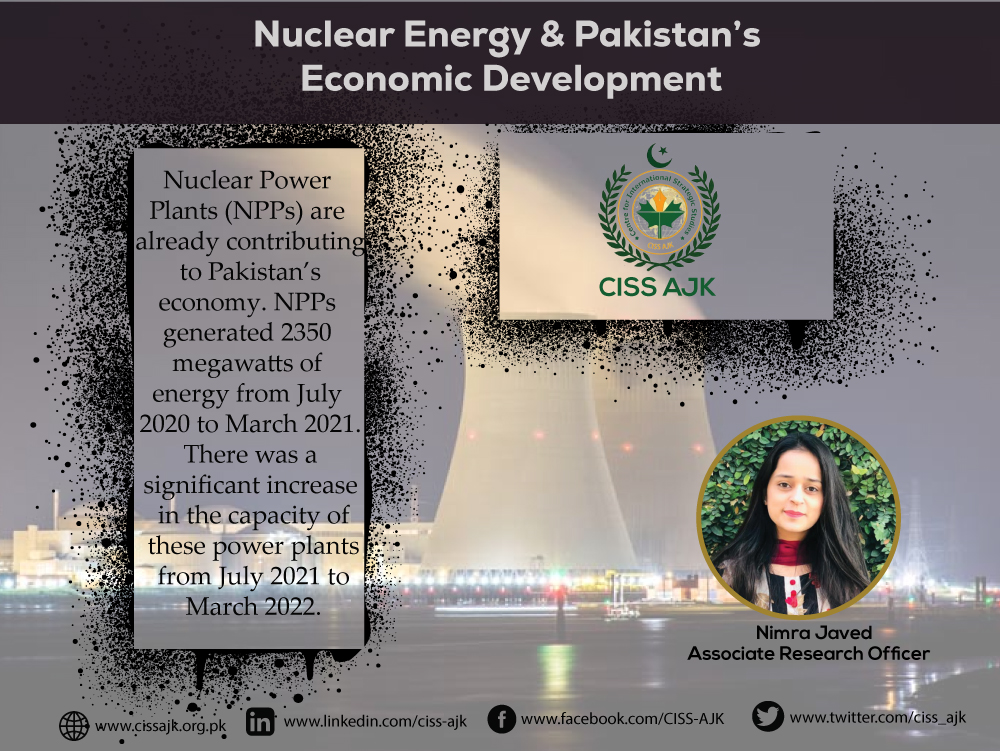653
Pakistan is going through a tumultuous time. Its economic condition is deteriorating every day, and there are even concerns about Pakistan going towards default. However, the Pakistani finance minister vehemently denies Pakistan’s possibility of defaulting. However, to keep Pakistan out of economic turmoil and ensure economic security in the long term, a sustainable, cheap, and clean source of energy is required. Nuclear energy is a great source of clean and green energy.
In the book, “The Quest: Energy, Security, and the Remaking of the Modern World,” Daniel Yergin argues that nuclear energy creates an unbreakable link between energy and the economy. It empowers nations to achieve economic security by increasing industrial competitiveness, increasing jobs, and reducing dependence on costly imports. Pakistan can also utilize nuclear energy to ensure long-term economic security.
Nuclear Power Plants (NPPs) are already contributing to Pakistan’s economy. NPPs generated 2350 megawatts of energy from July 2020 to March 2021. There was a significant increase in the capacity of these power plants from July 2021 to March 2022. These plants increased their capacity from 2350 megawatts to 3550. Furthermore, during this period, NPPs produced 12 percent of countries’ electricity needs. Pakistan Atomic energy commission has targeted producing 8000-megawatt electricity by 2030.
According to the International Atomic Energy Commission, electricity through NPPs has shown positive results in Pakistan’s economy. Pakistan lacks money and energy, which hampers economic growth.
According to Bloomberg, factories in Pakistan were warned that they might be unable to sustain production due to high energy costs. It became impossible for 40000 factories in Karachi to keep working due to a power shortage. Poor energy supply worsens the firm’s productivity and profitability.
According to the study published in Energy Strategy Review, poor energy significantly impacts profitability and productivity. This study analyzed the impact of energy on the profitability and productivity of 424 non-financial listed companies in Pakistan from 2001-2017. Seven measures, in which four measures of electricity shortfall (i.e., neutral period (NP), increasing shortfall (IS), worst shortfall (WS), decreasing shortfall (DS), energy consumption (EC), energy price (EP), and access to electricity (ATE)) were used to examine the impact of energy on the profitability of these companies. During increasing shortfall, worst shortfall, and decreasing shortfall, companies’ profitability was reduced by 39 %, 36 %, and 33 %. Furthermore, this study also showed an increase in companies’ profit by 33 percent during the stable energy supply period.
This study highlights that a stable energy supply is important for economic security. Lack of energy leads to economic insecurity because when firms are not profitable, they will not fire people and incline to shut down their businesses. It will create unemployment as well as people’s purchasing power will decline. Furthermore, when domestic production declines, Pakistan will import the products to meet the need. It creates a balance of payment issue.
Furthermore, the energy shortage also reduces foreign direct investment in Pakistan. In 2019, according to the World Bank Ease of Doing Business Index, Pakistan was ranked 108th out of 190 countries due to the energy crisis. When foreign direct investment is not coming due to the energy crisis, domestic factories’ profitability declines due to the energy crisis, and factories are also shifting their problems for Pakistan’s economy, which is already facing many challenges. This year, Pakistan also decided to close malls and businesses at 8: 30 pm because Pakistan wanted to save 60 billion rupees in terms of the cost of importing fuel to run electricity plants.
Therefore, Pakistan must start incorporating nuclear energy in its energy planning. The government has introduced different energy policies in the past, for instance, the power generation policy 2015 and the Alternative Renewable energy policy. Both of these energy policies talk about affordable and sustainable sources of energy. Nuclear energy is the cleanest source of energy as well as the most affordable form of energy after hydro. However, unlike hydro, whose production depends on the water and seasons, nuclear power is a stable energy source.
According to the achieve net zero targets, 100 billion dollars should be invested annually. Pakistan’s energy policy also wants to achieve sustainability. Therefore, Pakistan must invest in nuclear power plants to ensure economic security. Furthermore, according to the World Nuclear Association, the cost of building nuclear power is less competitive as compared to other forms of electricity generation. In addition, small modular nuclear reactors will completely transform the landscape of nuclear energy. Hence, Pakistan must invest in nuclear energy to ensure economic security. It will reduce the cost of electricity, make businesses competitive and ensure economic security.

